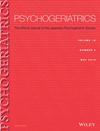Effectiveness of a cognitive behavioural therapy app developed for care workers involved in elderly care
IF 1.7
4区 医学
Q3 GERIATRICS & GERONTOLOGY
引用次数: 0
Abstract
With the global spread of COVID-19 since 2020, care workers have been subject to serious psychological distress. Older adults are more likely to get severely ill from COVID-19. Therefore, care workers involved in elderly care are required to take strict infection control measures, leading to restrictions and other stressors in their daily lives. Cognitive behavioural therapy (CBT) has gained attention in recent years as a method for managing stress. With the current spread of COVID-19, online CBT interventions targeting healthcare workers are becoming increasingly common. However, these programs require many sessions implemented over a long period of time and may not be suitable for busy and tired care workers. Therefore, this study seeks to create and examine the effectiveness of a cognitive behavioural therapy-based app that care workers can quickly and easily use at home on a tablet device. The study participants were six care workers (two men and four women; mean age 50.3 11.4 years) who work for a social welfare corporation and provide homevisit care to elderly people. This study was approved by the Tottori University Ethical Review Board. All participants providedwritten informed consent. The app consisted of five modules. The first module comprised a task to enable participants to gain an understanding of the correspondence between thoughts and moods. The second module comprised a task to enable participants to notice negative moods, in which participants looked back on their day and selected the mood they felt most strongly from among the nine negative moods. The third module comprised a task which enabled participants to notice the thoughts that came into their minds, in which participants were asked to put in those thoughts when they were experiencing a negative mood. The app displayed suggestions for typical examples of thoughts corresponding to each mood. The fourth module comprised a task which enabled participants to find rational ways of thinking, in which participants were asked to think of and put in rational thoughts that were different from negative thoughts by thinking about them from a different perspective. The app displayed suggestions for rational thoughts corresponding to each of the moods. The fifth module comprised a task that enabled participants to think about behaviours that they could implement that would make the next day more pleasant. The app provided suggestions for four different ways of thinking about pleasant activities, such as: simple actions, specific actions, things that you want to do instead of things that you ‘should’ do, and actions that match up with your values. The app was configured to require no more than 10 minutes per session.一款认知行为治疗应用程序的有效性,该应用程序是为参与老年人护理的护理人员开发的
自2020年以来,随着COVID-19在全球范围内的传播,护理人员遭受了严重的心理困扰。老年人更有可能因COVID-19而患上重病。因此,参与老年护理的护理人员需要采取严格的感染控制措施,从而导致其日常生活中的限制和其他压力因素。近年来,认知行为疗法(CBT)作为一种管理压力的方法受到了人们的关注。随着当前COVID-19的传播,针对医护人员的在线CBT干预措施正变得越来越普遍。然而,这些计划需要在很长一段时间内实施许多次,可能不适合忙碌和疲惫的护理人员。因此,本研究旨在创建并检查基于认知行为疗法的应用程序的有效性,护理人员可以在家中通过平板设备快速轻松地使用该应用程序。研究参与者是六名护工(两男四女;平均年龄50.3岁(11.4岁),在社会福利法人工作,为老年人提供上门服务。这项研究得到了鸟取大学伦理审查委员会的批准。所有参与者均提供书面知情同意书。该应用程序由五个模块组成。第一个模块包括一个任务,使参与者能够理解思想和情绪之间的对应关系。第二个模块包括一个让参与者注意到消极情绪的任务,在这个任务中,参与者回顾他们的一天,从九种消极情绪中选择他们感觉最强烈的情绪。第三个模块包括一个任务,让参与者注意到他们脑海中出现的想法,在这个任务中,参与者被要求在经历消极情绪时把这些想法放进去。该应用程序显示了与每种情绪相对应的典型想法示例的建议。第四个模块包括一个让参与者找到理性思维方式的任务,在这个任务中,参与者被要求从不同的角度思考不同于消极思维的理性思维。该应用程序显示了与每种情绪相对应的理性思考建议。第五个模块包括一个任务,让参与者思考他们可以实施的行为,这将使第二天更愉快。这款应用提供了四种思考愉快活动的不同方式,比如:简单的行动、具体的行动、你想做而不是“应该”做的事情,以及符合你价值观的行动。该应用程序配置为每次会话所需时间不超过10分钟。
本文章由计算机程序翻译,如有差异,请以英文原文为准。
求助全文
约1分钟内获得全文
求助全文
来源期刊

Psychogeriatrics
Medicine-Geriatrics and Gerontology
CiteScore
3.60
自引率
5.00%
发文量
115
审稿时长
>12 weeks
期刊介绍:
Psychogeriatrics is an international journal sponsored by the Japanese Psychogeriatric Society and publishes peer-reviewed original papers dealing with all aspects of psychogeriatrics and related fields
The Journal encourages articles with gerontopsychiatric, neurobiological, genetic, diagnostic, social-psychiatric, health-political, psychological or psychotherapeutic content. Themes can be illuminated through basic science, clinical (human and animal) studies, case studies, epidemiological or humanistic research
 求助内容:
求助内容: 应助结果提醒方式:
应助结果提醒方式:


